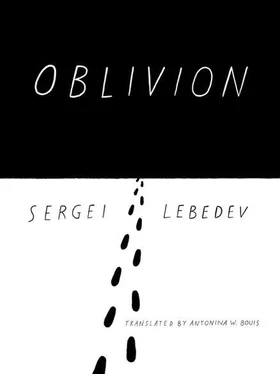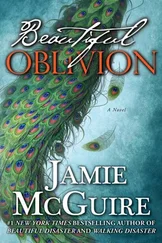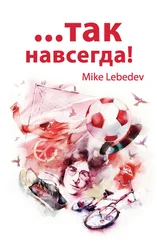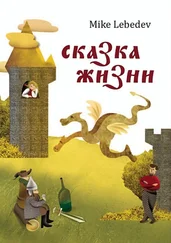But this very pile of bills reminded me how I had gone to tidy up Grandfather II’s grave as a teenager; I thought I could go to the cemetery safely now, no longer fearing the revulsion of having the old man preserved inside me. I must have wanted to come to terms with Grandfather II, let go of those old memories and replace them with new ones, and I chose a time on the eve of my birthday: I thought that I would clean up the grave and step into the new year of my life on different terms with the past.
It was spacious and cool at the old cemetery; the mosaic on an ancient crypt depicted Charon bearing the dead across the River Styx, and in rhythm with the oarlocks came the creaks of the cemetery caretaker’s cart; dirt protruded onto the paths from beneath the gravestones, as if the dead needed more space.
I swept around the grave and watered the ferns and peonies; I smoked, looking at the neighboring plot, where a husband and wife were buried, Ivan Pavlovich and Sofia Vasilyevna Bessmertny; the black slab produced an iridescent play of blue shimmers, like the eyes on a butterfly wing; crows squabbled high in the branches.
It was empty and fresh, as if on the edge of a meadow; I thought that the past had finally gone and Grandfather II had left me in peace; I even thought that I could come to the cemetery more often—I had gotten over his hold on me, it was past its sell-by date determined by some unknown but active laws, and in the new times I would distance myself even more from those old feelings, cover them with another attitude toward Grandfather II; an attitude which essentially did not presume an attitude but only an elastic habit of memory, which actually makes you forget more deeply; you don’t remember what had been but only a memory of a memory, and the past moves away and diminishes, like an object reflected in opposing mirrors.
I walked down the path, not looking around, bearing this new mood in me; there was only a slight sorrow that everything happened too easily and imperceptibly. The cemetery fences, crosses, trees—everything was freed of the heavy feeling created by memories and appeared with a new ease; I walked slowly, I wanted to stay longer, to remember it all anew. The cemetery had changed even in its color scheme, there were light green and straw tones I had never noticed before.
Suddenly I saw an old crumbling stump and on it a floury and plicated tree mushroom, looking like a fat ear.
An ear—the underground world was listening, it was here, I just hadn’t noticed it in the sunny omens of the day. It all came back: fear, loathing, chills; the mushroom looked like the flesh of a corpse and it lived a vegetative existence; Grandfather II had not let go of me.
My craving to escape my parents’ home as a young man was multiplied by the desire to be where nothing reminded me of Grandfather II; I could never be myself on the streets of our hometown—I was always a little bit him, as well: here I had taken Grandfather II to the shoemaker, here we’d walked from the train station, here we’d bought him a suit.
In this city I had lost the ability to be anonymous; for true anonymity is not in being unrecognized but in the fact that the environment does not mirror, does not return you to yourself with the help of memories.
There are places that become obsolete: many things are tied to them, but they are tied to a former you; there you are mostly a person from days past rather than now. The whole city and all its streets had become like that for me; when I was in the last grades of high school, I even tried to find new ways of getting there, instead of the usual routes, overlaying a new map on the old one; but decades of life without moving made that maneuver impossible: every road had been traveled, every sight seen. So I chose geology as a profession; I needed to get as far away as possible, to be in new areas, freed of a binding legacy.
I saw the world; but the important thing is that I traveled the country from edge to edge. It turned out that there is the gravity of destiny; there is a field that is always wider than how we see it; my departure, my work in distant places was just a path for returning to what I had hoped to escape. But I returned a different man, ready to accept and assume my inheritance, even though I did not know about this readiness until life summoned me.
In an old city, and especially in a capital, passing eras leave behind the significance and passion of architecture; the legacy of various years creates a contradictory urban ensemble, splendid and magniloquent; the buildings emit a glow, and it illuminates them. Therefore the past is not visible there; only magnificent façades remain. What lies behind the façade cannot be understood without archives and witnesses.
But in nature, everything a man does remains exposed; you cannot hide anything behind architecture, behind high-rises, bridges, or monuments; there is also little that can be hidden in a city whose cultural patrimony comprises only one era and which emanates the general aesthetic of that era.
Therefore, the first time I flew in a helicopter over the taiga, approaching a northern town, and I saw the star-like pattern of logging radiating through the heavy forests, dozens of kilometers of logged forests and the low camp barracks, some still active, some abandoned, I learned more from my impression than I could have read in books; I saw the effect created by the camps, the catastrophic vision of an environment organized in such a way that you could not recognize the evil of it.
Many people were deprived of life, of fate, of freedom; in the context of that enormous, all-encompassing evil any lesser evil became invisible; it became possible to live where everything—from the look of the housing to speech—dehumanized instead of humanized; the camp and the housing for former inmates expanded, settled in, and began reproducing itself without the state’s involvement. My passage through these parts, changed by the camps, became my path of return: to Grandfather II and his life and works.
I can’t set down everything I encountered and saw in my wanderings, to bring it all together in a text; so now I am holding the 25 rubles from the mine where they buried money; I feel there are passages through time that can briefly connect what should have been learned and understood; for me such a passage, a keyhole, is Lenin’s profile—if you don’t look at it but through it.
The first look—through the portrait—is into the time before my travels, in my last year of school.
Behind our school stood the burned-out remains of a two-story house: the broken walls guarded piles of charred beams and crumpled iron sheets; the house gave off the sense of a dead catastrophe, and it summoned you inside, to study its core, see the ugly frozen agony of things—to come close without risk to the hardened face of death which could no longer look back.
I climbed into the house; the destruction inside was not as bad as it looked from outside. But as I opened a door in the hallway I almost stepped into a void: the door opened right below the ceiling of a large space, a former sculptor’s studio. The stairs leading down had collapsed; the studio was filled with rubbish that fell when the house was burning, and you couldn’t tell it was there from the façade; a hidden room, the secret of the burned building.
Dozens of Lenins stood on the floor: just busts. Plaster, granite, metal, plasticine, the size of a child’s head and waist-high on an adult. The Lenins looked at one another, the beam of my flashlight was weak, and in the far corners the sculptures easily blended with the dark, like ghosts incarnate of former times, the shadows of monuments.
The air smelled of ash, stone, dust; dust covered their heads, the floor, the scattered sculptor’s tools; this was not wispy household dust, practically weightless—this was solid dust that could have been the remains of a plaster sculpture; too heavy to be moved by a powerful draft.
Читать дальше












